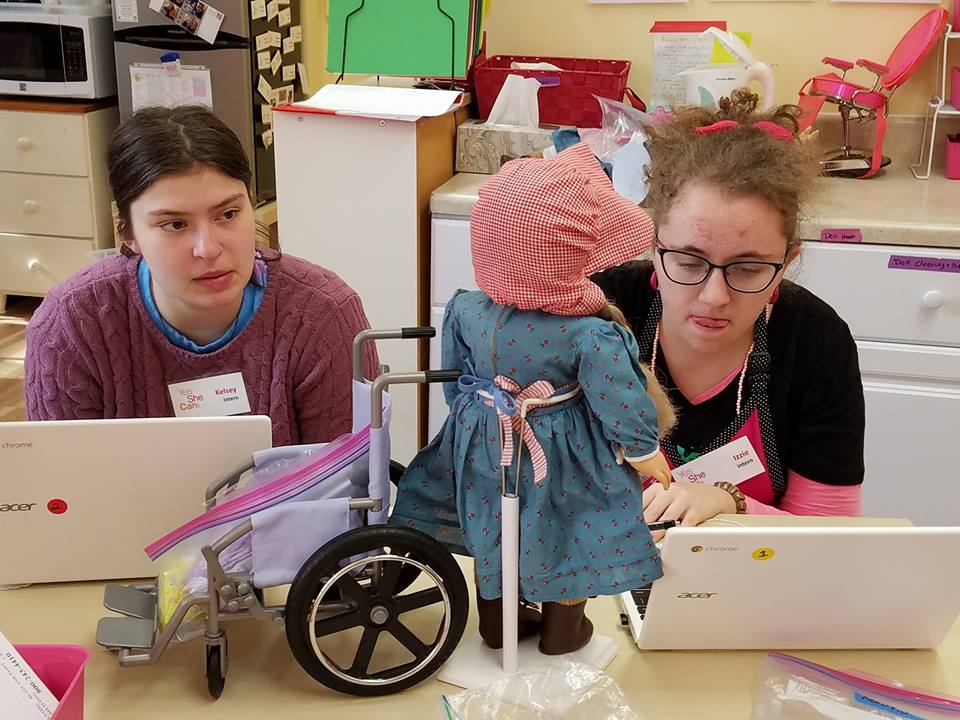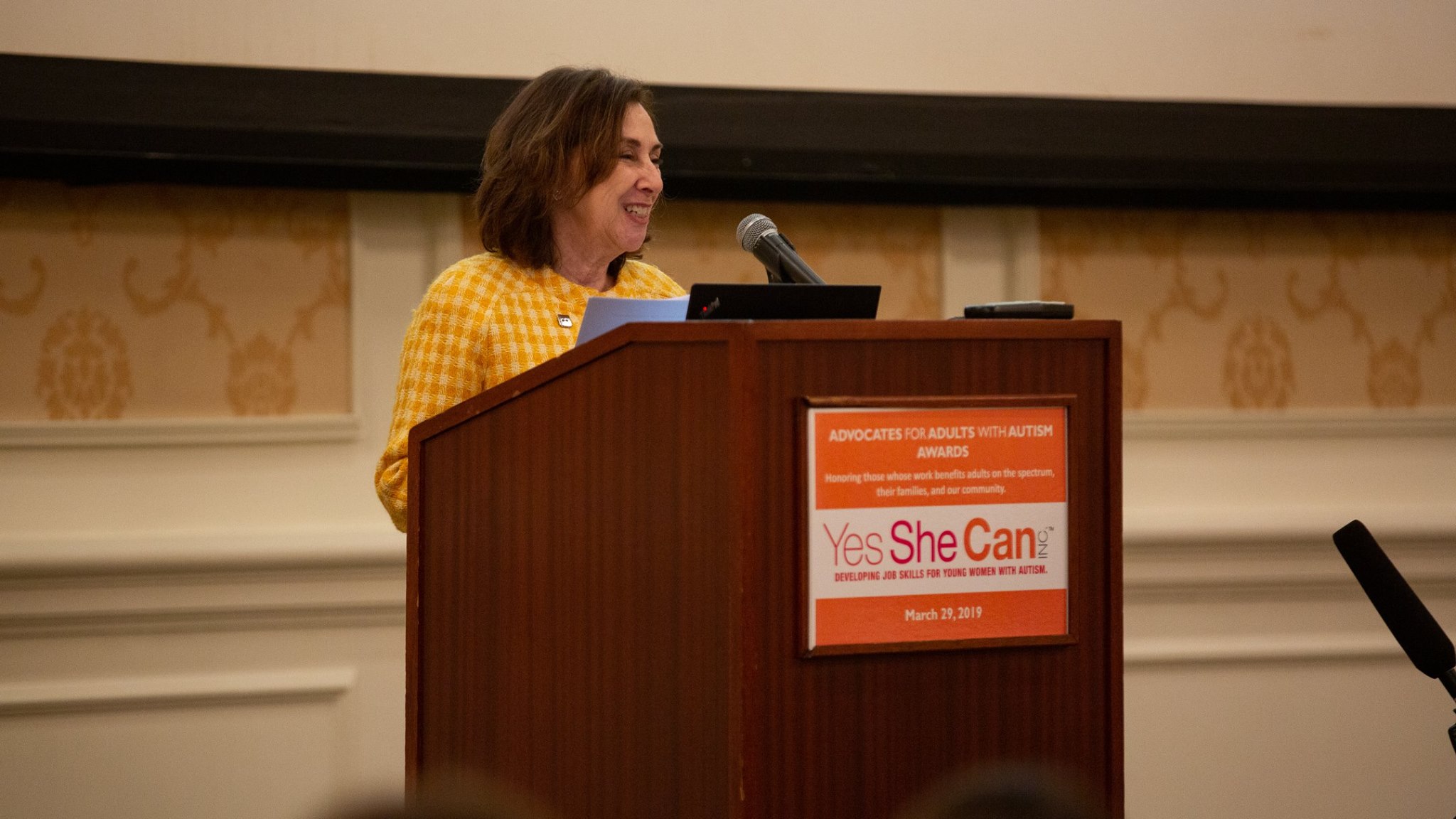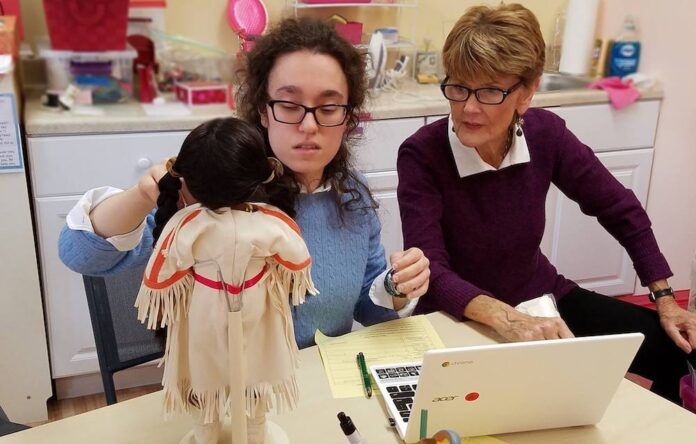Teenager Isabelle lights up when she talks about her passion for American Girl dolls. She knows the backstories of most of the dolls and serves as an expert-in-residence at Girl AGain, an American Girl boutique store in White Plains, N.Y. Plus, she loves to style their hair and coordinate different outfits.
What makes Isabelle—and Girl AGain—unique? Isabelle is on the autism spectrum and her workplace serves as a “training lab” run by the nonprofit Yes She Can, Inc. After retiring from a 30-year career in corporate marketing, Marjorie Madfis (Isabelle’s mother) launched the nonprofit, in 2013, to help young women (ages 17 and older) with autism spectrum disorders (ASD) develop transferable job skills. The primary objective to is empower these young women to join the competitive workforce.
With an estimated 80% of adults with ASD unemployed or underemployed, Marjorie wanted to paint a brighter future for Isabelle and other young women just like her. Girl AGain, the organization’s first program, sells gently loved American Girl dolls, accessories and books. Tapping into Isabelle’s American Girls fandom, Marjorie created this business concept to marry her daughter’s passion for the brand with the market demand for the resale of American Girl merchandise. “We sell dolls, but we’re not in the doll business—we are in the job skills development business,” their website proudly proclaims. Girl AGain serves as a first-of-a-kind incubator and laboratory where these young women with ASD get nurtured at work without the pressure of a for-profit business.
“My autism makes some things difficult for me, like tolerating noisy places, understanding what people mean, being flexible and managing my anxiety,” Isabelle shares in a video on the Yes She Can website. When it comes to other young women like her, Isabelle points out, “We want to have a job, we want to earn money, we want to become more independent, we want to become more accepted and we want to be included.” Isabelle, it turns out, wants the same things we all want!
The trainees learn functional business skills (such as stocking inventory, using the cash register and helping with the website) and workplace social skills (such as communication and teamwork). This provides a dual benefit, as it improves the trainees’ skills and fosters positive interactions with customers of all ages. For example, whether customers shop in store or via phone, they engage with the trainees who assist with purchase decisions, process transactions and communicate by email and phone to provide customer service.
“Customers are children and adults who are now exposed, often for the first time, to people with autism and developmental disabilities performing effectively to satisfy customer needs,” notes Marjorie.
So, who helps whip these trainees into shape? A team of workplace “coaches” provide the practical training needed to succeed in the real world. The coaching team includes both paid and volunteer specialists, including speech pathologists, licensed clinical social workers and psychologists. In addition to teaching the women about inventory levels, pricing and product presentation, the coaches also help the trainees manage their behavior and social challenges and regulate their emotions. Together, the team has provided more than 4,000 hours of direct coaching since the program began.

In addition, peer models work side-by-side with the trainees, providing an inclusive, collaborative approach to this real-world training. Since launching the program, Yes She Can has served 44 young women and provided them with more than 10,000 hours of workplace-ready training.
Although Yes She Can does not provide job development or job placement, to date, more than one dozen trainees have gone on to employment with other businesses after “graduating” from the program. The young women either work with community agencies to secure employment or find jobs independently.
“Most of our trainees have applied for services delivered by large disability services agencies,” explains Marjorie. She cites, for example, the Adult Career and Continuing Education Services-Vocational Rehabilitation (ACCES-VR) and Office for People with Developmental Disabilities (OPWDD), two agencies that receive funding to provide job development, job placement and ongoing job coaching. “We encourage our trainees to connect us to their agency so that we can collaborate,” she adds.
While Girl AGain directly benefits the trainees, the program also enlightens the community, businesses, customers and employees to be more respectful, accommodating and inclusive of people with autism in the workforce. On Saturdays, for instance, children come for workshops where the trainees interact with the girls to help them complete their craft or doll project. Other times, Girl Scout troops come for a session to learn about autism and then participate in a hands-on activity. Girl AGain also shares trainee stories to its 5,000+ Facebook fans and 2,000+ Instagram followers.
“In all cases we’re exposing neuro-typical people to the capabilities of people with autism,” Marjorie says. “We are educating them, and we are asking them to share their experiences with others.” But changing minds and hearts is a slow process, she admits. “Businesses will follow the lead of customers. If customers are comfortable interacting with people with disabilities, then businesses are more inclined to hire people with disabilities.”

Currently, Girl AGain is only available only in White Plains, but Marjorie hopes to expand elsewhere if the nonprofit can secure additional funding. “Our goal is to replicate our program so that it can be implemented in other locations across the country,” says Marjorie. “We’re seeking funding to help us package our curriculum and processes into a published tool and then license this for use by other organizations that have the staff and the candidates for the program.” This could open up program replication in other resale product categories beyond the American Girl brand.
And as for Isabelle… For years, she had set her sights on “doll hairdresser” at the American Girl store in New York City. Thanks to Yes She Can, Isabelle is living her dream!
Author’s Bio: Lisa Beach is a freelance journalist and copywriter. Her work has been published in The New York Times, Good Housekeeping, Eating Well, USA Today Go Escape Florida & Caribbean, Parents, and dozens more. Check out her writer’s website at www.LisaBeachWrites.com.






